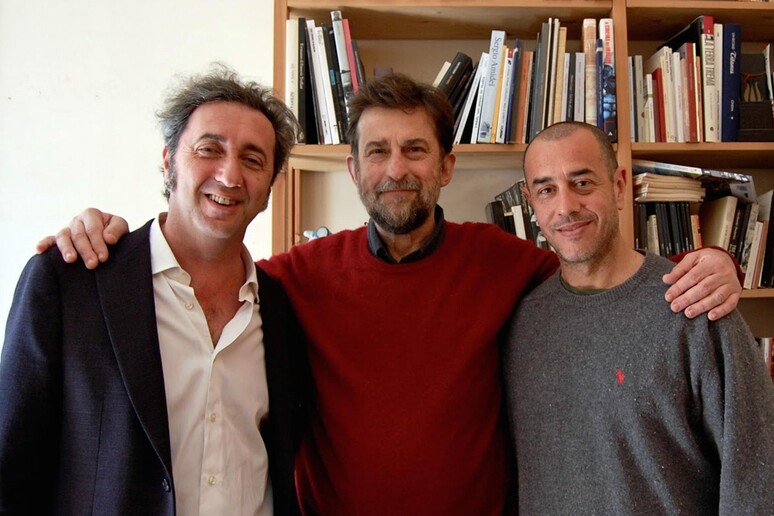A heavyweight trio of three of Italy's best-known directors are bidding for glory at this year's Cannes film festival, which opens on Wednesday, and according to the bookies one of them could land the biggest prize in art-house cinema.
The latest works of Paolo Sorrentino of Oscar-winning 'The Great Beauty' fame, Matteo 'Gomorrah' Garrone and Nanni 'Dear Diary' Moretti, who won the Palme d'Or in 2001 with The Son's Room, are among the favourites to land the coveted palm on May 24. Two of the three contenders are in English, Sorrentino's Youth and Garrone's Tale of Tales.
Moretti's 'Mia Madre' (My Mother), like many of the auteur's best films, is heavily biographical.
Sorrentino traces the nihilism he admires in his cult author Celine in Youth, which stars Harvey Keitel and Michael Caine as two octogenarian residents of an Alpine hotel taking age-defying cures and reminiscing about their ill-spent youth.
Grappling with the unacceptable indecency of old age, Mick (Keitel) and Fred (Caine) vainly try to stave off the inevitable and revive the spirit of their younger selves.
The bittersweet tale is shot through with jaded, melancholy and yet humorous exchanges, such as when Mick asks Fred "if you pissed today.
"A few drops," comes the world-weary reply - to which Keitel's character responds, sheepishly: "Me even less".
Garrone's Tale of Tales, a collection of three stories starring Salma Hayek, John C. Reilly, Toby Jones and Vincent Cassel, is based on Neapolitan baroque fantasy stories from 1600 in Giambattista Basile's work of the same name.
Juggling leitmotifs like birth, death, the cult of the body and desire, the film draws inspiration, Garrone says, from Game of Thrones, Tarantino favourite Mario Bava, and Goya's grotesque 'caprice' paintings.
Eschewing English-style high Gothic, however, Garrone attempts to infuse each tale with the light touch of Italian illustrated fairy tales such as the ones admired and collected by Italo Calvino - but with the quintessential flavour of the high-spirited sprawl and unexpected leaps of the imagination such as those produced and acted out on the colourful, teeming streets of Naples.
The first tale, The Enchanted Doe, with Hayek and Reilly, is about two sad childless monarchs who enlist the help of a sorcerer to try to magick up an heir by risking the life of another - only to produce an albino duo, one the offspring of a servant, who re-enact the eternal myth of the doppelganger.
In the second story, The Flea, Jones plays another doleful king who feeds an insect with his blood until it becomes as big as a pig, flays it and offers his daughter's hand to whoever can guess where the hide comes from. The winner is a florid ogre who whisks the girl off to his mountain lair.
In the third tale, The Skinned Old Woman - seen by many critics as a metaphor for cosmetic surgery - another king, played by Cassel, falls in love with a woman because of her voice only to find out that she is a crone.
Through magic, however, she succeeds in regaining her youth and becoming queen - though that turns out to be less than a permanent fix. Moretti's Mia Madre, meanwhile, casts stalwart actress Margherita Buy, in perhaps a career high, as the quirky director's alter ego, a filmmaker coming to terms with the impending loss of her mother - a high-school teacher of Latin and Greek, like Moretti's actual mother.
Struggling to finish a B movie with an egomaniac, bumbling actor played by John Turturro, Buy's character ferries her mother from one hospital to another in the vain hope of defeating death.
Moretti himself plays the old woman's son, who is perhaps the most fragile character of all.
Strenuously rationalising everything that happens, in true Moretti fashion, the man tries to help his sister cope with the looming loss and its attendant indignities.
Unlike the starkly portrayed and emotionally sapping impact of grief in The Son's Room, however, Moretti finds room for raging-against-the-dying-of-the-light humour and grace under pressure in a film that has been described as perhaps his most mature work.
In an unusual joint statement, Sorrentino, Garrone and Moretti said: "We are happy and proud to fly the flag for Italy.
We are aware that this is a great opportunity for ourselves and the whole of Italian filmmaking".
In other Italian film news Monday, it was announced that 'Anime Nere' (Black Souls), Francesco Munzi's dark saga of a family embroiled with the Calabrian 'Ndrangheta mafia, is leading the field at this year's Italian Oscars, the David di Donatello awards.
The critically acclaimed tale of family bonds vying with Mob ties on Monday received nominations in all 16 of the categories for the June 12 ceremony, including best picture and best director.
'Il Giovane Favoloso' (The Fabulous Youth), Mario Martone's depiction of the last days of Italy's great Romantic poet and thinker, Giacomo Leopardi, came second with 14 nominations.
Joint third with 10 nominations each were Moretti's 'Madre' and Oscar winner Gabriele Salvatores' 'Il Ragazzo Invisibile' (The Invisible Boy).
Veteran art-house favourite Ermanno Olmi's Torneranno I Prati (The Meadows Will Return) received eight nominations, while Saverio Costanzo's Hungry Hearts got seven. Edoardo Leo's 'Noi E La Giulia' (Us And Julia) also earned seven nods.
In other news, it was announced that Mexican director Alfonso Cuarón will head the jury at the Venice Film Festival in September.
The Biennale board led by President Paolo Baratta tapped Cuaron Monday, approving fest director Alberto Barbera's nomination. The 72nd edition of the world's oldest movie fest runs September 2-12.
Cuaron, known for Y Tu Mama Tambien (2001), Harry Potter and the Prisoner of Azkaban (2004) and Children of Men (2006), became the first Mexican to win an Academy Award for directing with 2013's Gravity starring George Clooney and Sandra Bullock.
ALL RIGHTS RESERVED © Copyright ANSA











